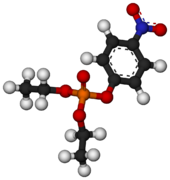
KNOWPIA
WELCOME TO KNOWPIA
Summary
Paraoxon is a parasympathomimetic which acts as an cholinesterase inhibitor. It is an organophosphate oxon, and the active metabolite of the insecticide parathion. It is also used as an ophthalmological drug against glaucoma. Paraoxon is one of the most potent acetylcholinesterase-inhibiting insecticides available, around 70% as potent as the nerve agent sarin, and so is now rarely used as an insecticide due to the risk of poisoning to humans and other animals. Paraoxon has been used by scientists to study acute and chronic effects of organophosphate intoxication.[1][2] It is easily absorbed through skin, and was allegedly used as an assassination weapon by the apartheid-era South African chemical weapons program Project Coast.[3]
 | |
 | |
| Clinical data | |
|---|---|
| ATC code |
|
| Legal status | |
| Legal status |
|
| Identifiers | |
| |
| CAS Number |
|
| PubChem CID |
|
| ChemSpider |
|
| UNII |
|
| KEGG |
|
| ChEBI |
|
| ChEMBL |
|
| CompTox Dashboard (EPA) |
|
| ECHA InfoCard | 100.005.657 |
| Chemical and physical data | |
| Formula | C10H14NO6P |
| Molar mass | 275.197 g·mol−1 |
| 3D model (JSmol) |
|
| |
| |
| | |
See also edit
References edit
- ^ Deshpande LS, Carter DS, Phillips KF, Blair RE, DeLorenzo RJ (September 2014). "Development of status epilepticus, sustained calcium elevations and neuronal injury in a rat survival model of lethal paraoxon intoxication". Neurotoxicology. 44: 17–26. doi:10.1016/j.neuro.2014.04.006. PMC 4176600. PMID 24785379.
- ^ Deshpande LS, Phillips K, Huang B, DeLorenzo RJ (September 2014). "Chronic behavioral and cognitive deficits in a rat survival model of paraoxon toxicity". Neurotoxicology. 44: 352–7. doi:10.1016/j.neuro.2014.08.008. PMC 4175062. PMID 25172410.
- ^ NTI Country Overviews:South Africa:Chemical Capabilities:Paraoxon Archived 2008-07-08 at the Wayback Machine


